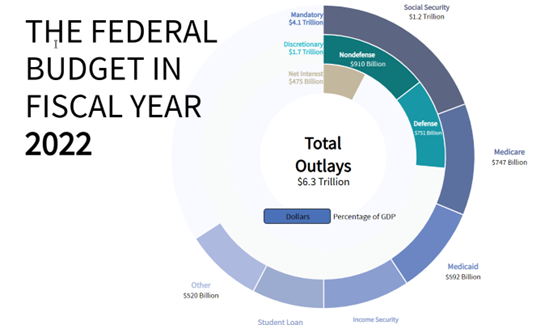By:
Dave Kingsley
Blaming the Elderly for U.S. Economic & Fiscal Problems
As the first Baby Boomers hit retirement age in 2011, propaganda and misinformation regarding the impact of older Americans on federal spending began to accelerate. Some of the erroneous media presentations of the elderly were not only inaccurate, they were vicious.
In a New Yorker article entitled “Greedy Geezer,” well-known journalist James Surowiecki wrote that older Americans are too selfish to care about other age groups. Although he offered no empirical evidence – nor, I’m certain, did he have any – Surowiecki described the attitude of people old enough to receive Medicare as “I’ve got mine – good luck getting yours.” (https://www.newyorker.com/magazine/2010/11/22/greedy-geezers).
The article included this cartoonish caricature of an angry elderly man chasing a younger man:

David Brooks, well known NPR and PBS commentator, wrote in a 2010 New York Times op. ed piece with the title, “Geezer Crusade”:
“Far from serving the young, the old are taking from them. First they are taking money. Second they are taking freedom. Third they are taking opportunity.
New York Times, February 2, 2010
Brooks was still on his crusade against the elderly last week. In an NYT op. ed. on Thursday, he wrote that,
“We continue to go further into debt even though the baby boom generation is aging, making programs like Social Security and Medicare more and more costly. The federal government already spends $6 on senior citizens for $1 on children, which is not exactly investing in the future.”
“America is Gambling With Its Future,” New York Times, April 26, 2024
These opinions from Brooks and Surowiecki are a mere smattering of what we have been seeing in the mainstream media for the past 40 years. The knowledge of most journalists regarding federal budgeting and Social Security and Medicare programs is limited and shallow. They have a serious misunderstanding of the cost of these programs and their relationship to the federal budget. Consequently, well-known media personalities are misleading the public with erroneous information harmful to older Americans.
The Correct Information about Medicare & Social Security
As reported in the 2023 Medicare Trustee’s report, a small proportion of Medicare expenditures are funded by income tax – that is, they are funded only partially by a transfer from the U.S. Treasury. As the table below indicates, of the $905.1 million in 2022 Medicare expenditures, only $432.2 million (48%) is from “Government contributions” or, as we say, “on budget.” Most of the other 52% of MC expenditures was funded by beneficiaries in the form of payroll taxes, premiums, and taxes on benefits.

Social Security has no impact on the federal budget. It is “off budget,” and receives no transfers from the U.S. Treasury. Indeed, with a trillion-dollar surplus in the SS Trust Fund, the federal government borrows money from SS (Special Issue bonds at 4% interest). These are not, as propagandists like to say, “IOUs that will never be repaid.” There is no incident in U.S history in which the U.S. has failed to recognize the validity of or to pay any and all federal debt. It would, as a matter of fact, be unconstitutional to renege on debt incurred by the federal government.
I can find no accurate presentation of the federal budget. For instance, the Congressional Budget Office has issued the following graphic:

Source: The Federal Budget in Fiscal Year 2022: An Infographic | Congressional Budget Office (cbo.gov)
This graphic is erroneous because it depicts the total federal budget as $6.3 trillion with SS contributing $1.2 billion and Medicare contributing $747 billion. No doubt, all of these funds are expended through a federal program, but they are not budgeted. To reiterate, none of the SS amount is paid for by income tax and are not part of the budget and only about 48% or $358 billion of MC is paid by a transfer from the treasury.
Tax expenditures are not included in every pie chart, line graph, and other type of federal budget graphic available. Nevertheless, the Budget Control & Reconciliation Act of 1974 requires inclusion of tax write downs for employer provided health insurance, depreciation, mortgage interest deduction, and other such deductions in the budget. These typically add approximately $1.5 trillion to the federal budget but do not appear as they should in presentations regarding the budget, whereas the full amount of SS and MC do appear erroneously and inappropriately.
The Consequences of Scapegoating the Elderly for Budget Deficits and Federal Debt.
The elderly population is seen as a disaster rather than as a respected age cohort in our society. Rather than celebrating the increasing number of productive older Americans whose experience and wisdom are assets that enrich our civilization, we are dreading and fearing the 65+ population as a looming economic problem for younger generations – metaphorically as a tsunami.

The debasement and diminishment of a group’s humanness and belongingness can be subtle and unintentional. The silver tsunami metaphor can be heard in the mainstream media – including on PBS and NPR. Giving a talk at a center on bioethics, I raised the issue of this damaging moniker placed on the growing 65+ age group and was shocked to hear that this was a revelation to the leader of the center. She was chagrined about her own use of the metaphor.
In the United States, the elderly are now stereotyped as greedy, selfish, and underserving. Unjustifiable harm to groups is justified through dehumanization of targeted groups such as the elderly and disabled. For instance, harmful treatment in a for-profit nursing home system or reduction in government benefits reduces the health and well-being of frail elderly people needing skilled nursing care. They are seen as getting all the help they deserve and more at the expense of the rest of the country – especially younger age cohorts.
The U.S. can afford beneficial care for meeting the medical needs of all residents. However, the dominant view of leading bioethicists (who have joined forces with misguided neoliberal economists) is that the elderly need to forego beneficial medical care. Rationing of medical care based on age can only add an injustice to a medical care system that is already rationing care based on luck, failed government policy, and wealth.
Political & Economic Context Cannot be Ignored: Propaganda and Objectification of the Elderly Lead to Discrimination & Harm
Unjustifiable harm to members of ethnic, gay, gender, age, and other identifiable groups is justified through dehumanization and stereotyping. The elderly in the U.S. are now targeted as greedy, selfish, and underserving. For instance, harmful treatment in the nursing home system or reduction in government benefits reduces the health and well-being of frail elderly people needing skilled nursing care. They have been objectified as product for making money from investment in commercial real estate and around the clock skilled nursing and post-acute care rehabilitation.
Social Security and Medicare benefits have been significantly reduced through changes in eligibility and other changes such as how the CPI is calculated. Social Security beneficiaries lost two years of eligibility in the mid-1980s after the Greenspan Commission recommended raising the age for full benefits from 65 to 67. An invalid CPI theory has been utilized for lower benefit increases in relation to cost of living increases. This keeps a large proportion of elderly Americans impoverished and struggling to meet their healthcare, housing, transportation, and other basic needs of living.
To reiterate, the U.S. can afford needed care for all people regardless of age. As mentioned earlier, the dominant view in the field of bioethics is in sync with the views of neoliberal economists and conservatives. Distinguished bioethicists such Zeke Emanual, Daniel Callahan, and Norman Daniels have proposed healthcare rationing by withholding beneficial healthcare from the elderly. Zeke Emanual claims that life is worthless past the age of 75 (see his article, “Why I Want to Die at 75”).
Widespread denigration of older age groups and the sorry state of medical ethics are leading to a chilling and perverse acceptance of harm to frail elderly and disabled patients in nursing homes. Widespread tolerance of neglectful, abusive treatment for the purpose of enhancing and protecting shareholder value can only be explained by propaganda leading to devaluation of human beings.

You are so right!
Fantastic and fascinating article. Thank you.